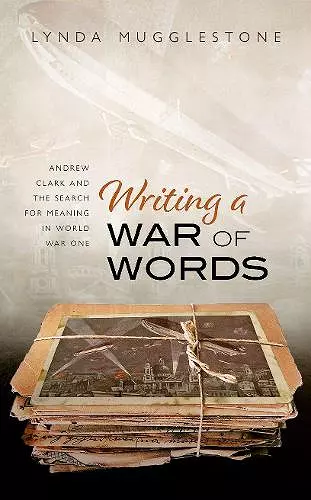Writing a War of Words
Andrew Clark and the Search for Meaning in World War One
Format:Hardback
Publisher:Oxford University Press
Published:28th Oct '21
Should be back in stock very soon

Writing a War of Words is the first exploration of the war-time quest by Andrew Clark - a writer, historian, and volunteer on the first edition of the Oxford English Dictionary - to document changes in the English language from the start of the First World War up to 1919. Clark's unique series of lexical scrapbooks, replete with clippings, annotations, and real-time definitions, reveals a desire to put living language history to the fore, and to create a record of often fleeting popular use. The rise of trench warfare, the Zeppelinophobia of total war, and descriptions of shellshock (and raid shock on the Home Front) all drew his attentive gaze. The archive includes examples from a range of sources, such as advertising, newspapers, and letters from the Front, as well as documenting social issues such as the shifting forms of representation as women 'did their bit' on the Home Front. Lynda's Mugglestone's fascinating investigation of this valuable archive reassesses the conventional accounts of language history during this period, recuperates Clark himself as another 'forgotten lexicographer', challenges the received wisdom on the inexpressibilities of war, and examines the role of language as an interdisciplinary lens on history.
Writing a War of Words is scholarly, as a definitive study should be, but eminently readable. * E. L. Battistella, CHOICE *
Writing a War of Words is an invaluable contribution both to lexicography and history 'from below', recording words and expressions which have been preserved thanks to Clark's immense efforts. It will certainly inspire future research which will provide new insights into the lexical impact of the Great War on the English language. The book will be of interest to lexicographers, language historians, historians and anyone interested in World War I and its discourse, which can be extended to the discourse of war in general. * Prof.Dr. Lelija Socanac, The LINGUIST *
Lynda Mugglestone's "Writing a War of Words" is a fascinating account of the immense effort of Andrew Clark, a diarist, historian and philologist, to record in minute detail the fleeting existence of English words and shifting meanings which appeared during the Great War in a variety of unconventional sources such as advertising, newspapers, and letters from the Front. This immense lexical richness vividly recreates different aspects of everyday life of ordinary people facing the harsh realities of war. * Lelija Socanac, University of Zagreb, Linguist List *
Mugglestone has a shrewd understanding of the technical business and psychological climate of lexicography. Her research is scrupulous, and through her analysis Clark's catalogue of usage comes to seem an achievement of almost Johnsonian proportions - each page a time capsule, and the whole project an extraordinarily detailed map of the period's changing "langscape"... a generous tribute to his [Clark's] linguistic curiosity and curatorial intelligence. * Henry Hitchings, Times Literary Supplement *
The voluminous diaries and scrapbooks Andrew Clark compiled during World War One prove him alert to words and usage of the time and a skilled and prescient commentator on their significance. In her new book, Lynda Mugglestone reconstructs Clark's account of the 'war of words' amidst the war, his finger, as she puts it, 'on the pulse of words in time', equally an apt description of Mugglestone's historical touch. Anyone with an interest in the history of English, the Great War, or the Oxford English Dictionary, to which Clark contributed, must read Writing a War of Words. * Michael Adams, Indiana University Bloomington *
Lynda Mugglestone's Writing a War of Words is a revelation. It tells the story of Andrew Clark, a diarist and philologist whose reflections on language and the Great War offer a wealth of information about English linguistic history and its social contexts. But more generally, it reveals the centrality of the Great War to the study of the English Language itself. Much has been made of Tolkien's war and its impact on his philology and fantasy. Clark is different: he is a personal, self-reflective writer, an acute observer of words and people, and a historian of the imagination. His diary is a true discovery, and Professor Mugglestone shows him standing on a par with Siegfried Sassoon and Robert Graves. Writing a War of Words will stand with Paul Fussell's The Great War and Modern Memory as a lasting, revisionary account of early twentieth-century personal writing, language change, and the wartime literary imagination. * Seth Lerer, University of California, San Diego *
ISBN: 9780198870159
Dimensions: 223mm x 146mm x 30mm
Weight: 562g
368 pages